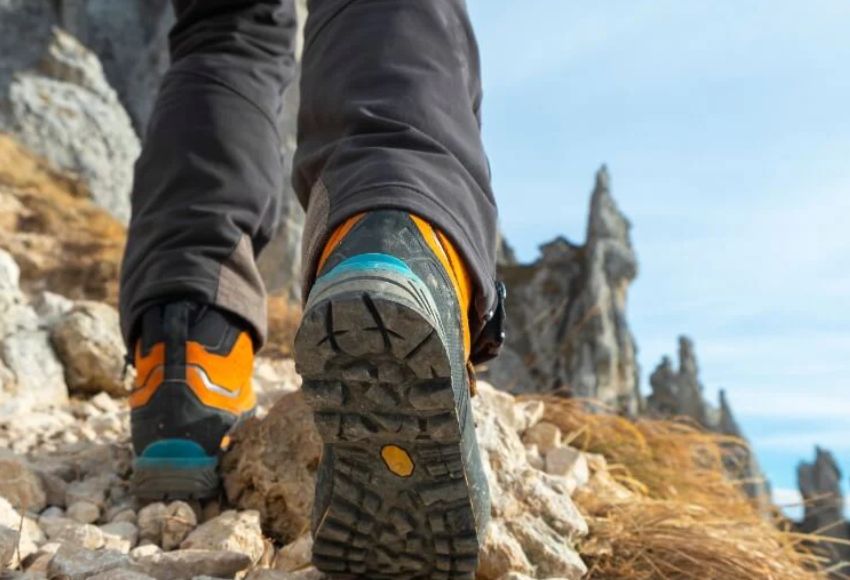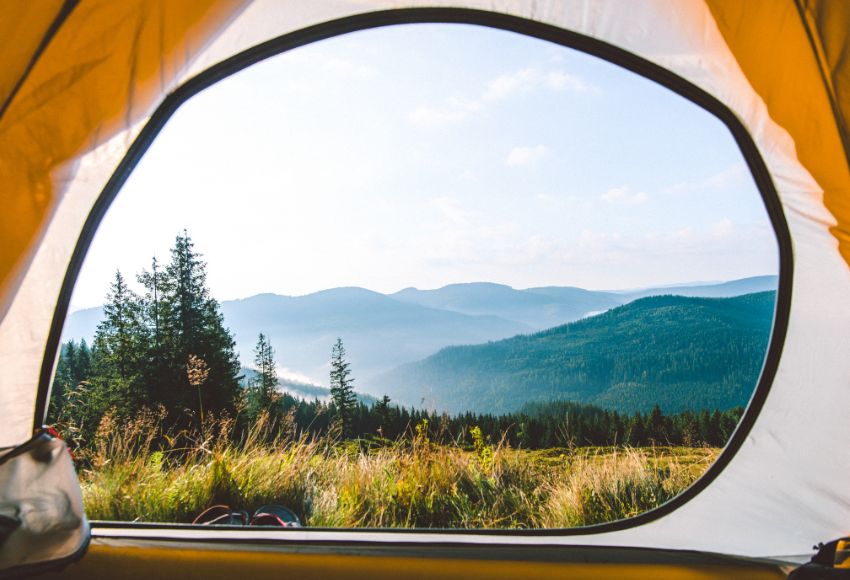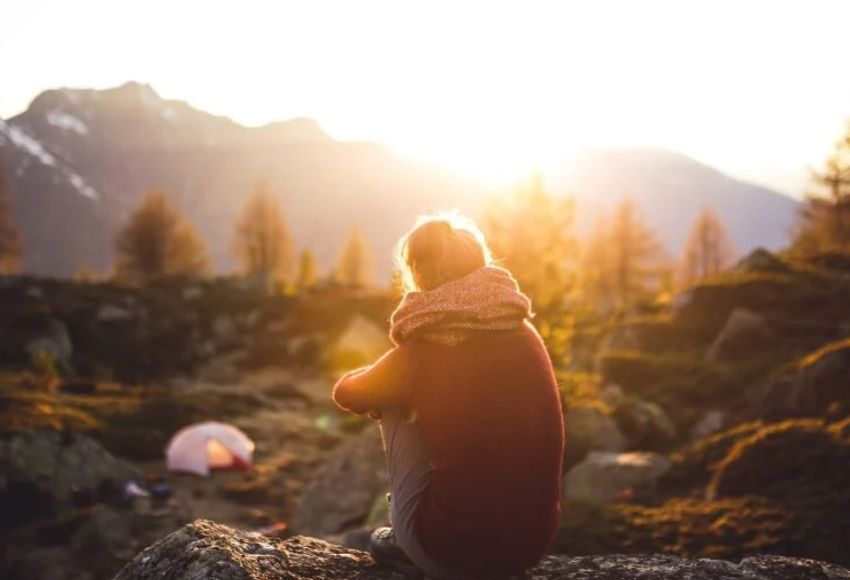…and how a journey of hundreds of kilometers can change you
At first it might just be a desire for a longer vacation. You need to clear your head, maybe escape from a world where everything is planned by the hour. And then you try a long-distance trek for the first time. Maybe just 3 days. Maybe 100 kilometers. Maybe more.
And something will change. In you. In how you perceive the world around you. Long-distance treks are not just about performance, but mainly about slowing down. About returning to basics – walking, eating, sleeping, the landscape. If you haven't tried it yet, here are 7 reasons to start this year.
1. A physical challenge that won't put you down – but will make you stand up
On a long-distance hike, you're not running away from the world. You're on a journey to yourself. Every day you get up, throw your backpack on your back, and set off. No calendar. No lectures. Just you and the journey. And even if you're tired in the evening, you feel a special kind of energy. It's not adrenaline. It's a return to what the body does best – movement.
You will become physically stronger. Your muscles will adapt, your stride will lengthen, your breathing will slow down. You will learn to perceive the rhythm of your body. How to eat to keep your energy up. How to know when to push harder and when to slow down. And most importantly – you will discover that you don't have to be a top athlete to be able to set out on your own journey.
Long-distance walking is not a sprint. It's a daily rhythm that builds endurance, strength, and resilience. You don't need to be an ultramarathoner—you need discipline, pace, and the will to keep going. A little bit every day.
- You will strengthen your muscles, heart and joints
- You'll burn thousands of calories, but you'll also eat like a king
- You will learn to perceive your body and what works for it.
2. A mental reset like no other
Everyday life is full of noise. Emails, notifications, overstuffed diaries. Even when you turn off your phone, your head is still racing. But on a long-distance trek, something changes. Somewhere around the third day, you start to notice that the pace of the world is slowing down. And so are you.
You only think about when you will eat, how much water you have and where you will sleep. Office worries or relationship dilemmas diminish with each passing kilometer. All that remains is movement. Silence. And time to think – or simply to be.
It's like rebooting your system. Only instead of a keyboard shortcut, you use a rain jacket, a backpack, and a few blisters.
A long-distance trek will offer you mental silence. Just your thoughts, footsteps, breath, and the landscape.
- Long walks lead to deep thinking
- You will naturally enter a state of flow
- Offline = presence here and now
3. You will gain real skills
Everything you do on a trek is to survive and move on. In practice, this means learning how to cook on a stove, filter water from a stream, choose the right place to bivouac, or recognize an approaching storm. You learn to plan, build a fire, repair your backpack, read a map, and your emotions.
Skills that might seem useless in everyday life suddenly make deep sense. You stop being scared of power outages or rain. You start to trust your decisions. And every next situation only makes you stronger.
Trek is like a survival textbook - only instead of tests, you get daily practical tasks. And when you complete them, the reward is a sunset, a warm soup, and the knowledge that you arranged it all yourself.
You can learn more in a few days in nature than in months on YouTube.
- Navigation, hygiene, minimalism
- Fast food, efficient packaging
- The art of improvisation in all weathers
4. Minimalism in practice – you will find out what you really need
You start with a heavy backpack. You can use anything, you tell yourself. After a few days, you realize that some things may be useful, but most of them just take up space and add weight. Every gram counts. Every detail counts.
And just as you throw away unnecessary things from your backpack, you start doing the same in your head. You get rid of unnecessary thoughts, expectations, things that were weighing you down. Not because they stop being important – but because you discover what is really important.
Trek teaches you to be efficient. But not like at work. It's about inner efficiency – less thinking, more presence. Less stuff, more freedom.
On a long-distance trek, you carry everything on your back. And you quickly find out what is unnecessary and what is essential. You get rid of the excess not only from your backpack, but also from your head.
- Every gram has meaning
- You will learn to rely on fewer things.
- You will gain a new perspective on "comfort"
5. You will connect with nature… really
Not for half a day. Not for a return trip. A long-distance trek means you live in nature. You sleep in the forest, you cook by the stream, you are woken up by the light in the morning and soothed by the singing of birds in the evening.
You start to notice the details. How the light changes throughout the day. How the forest smells different after the rain. What sounds the wind makes as it leans against the rocks. And you discover that with all of this, you can be silent – and feel completely safe.
Your body will adapt to nature faster than you expect. And your mind? It will calm down once it understands that you are not a stranger here – you have just forgotten where you come from for a moment.
Long-distance treks allow you to live in nature. Experience sunsets, morning dew, stars overhead, silence after the rain. You become a part of it.
- Daily rhythm according to light
- Evening by the fire or just with a headlamp
- A chance to meet animals in their world
6. You will meet a community that speaks the same language
Long-distance treks are not a mass phenomenon. But those who undertake them often have a similar mindset. They are not just looking for physical performance. They are looking for depth. Connection. Exceeding one's own limits.
And even if you are alone most of the way, sometimes you will meet someone else. Someone will give you water, someone will share soup with you. Some will invite you under the shelter, others will just wish you a safe journey. And this invisible alliance – that is priceless on these journeys.
It's a strange world. Full of silence, but also stories. And anyone who has ever gone on a long-distance trek understands this without words.
Although many long-distance treks can be done solo, you will often meet other trekkers. This community shares understanding, experiences and stories that will enrich you.
- Trail angels, familiar and unfamiliar faces
- Sharing routes, tips and small big adventures
- Even silence can be part of communication
7. You will change – and no one can take that away from you.
You won't change right away. But it will happen. Sometimes on day 4. Sometimes on kilometer 80. Maybe when you're heating water in the rain. Or when you reach your destination and look at your feet - dirty, tired, but proud.
A long-distance trek strips you of everything unnecessary. But what remains is solid, calm, and true. The things that used to upset you suddenly lose their power. Because you know you've walked hundreds of kilometers. And inside you stood up for yourself. And you stood up.
You may not find the answers to all your questions. But something inside you will settle down. You will throw away the unnecessary, you will clarify who you are. You will discover that you do not have to have everything under control - and you can still reach your goal.
- Internal compass
- Self-confidence and peace of mind
- Your legs will carry you further than you thought.

How to get started? Your first long-distance steps
You might be thinking: can I do it? Isn't that a lot? The truth is, you can do more than you think. And you don't have to start with the Pacific Crest Trail. Just a small step. A two-day hike. A weekend with a backpack. And the desire to keep going.
Want to try your first long-distance trek? Here are some tips to get you started:
- Start with what you have. You don't have to buy UL gear right away - try a weekend transition first.
- Try Via Czechia – a Czech long-distance hit, accessible and beautiful.
- Try the Alpe Adria Trail, GR20, or the Slovak SNP Heroes' Trail if you want to go abroad.
- Train on shorter hikes with a backpack. Learn how your body reacts.
- Ask questions. Read. Follow the community. Everyone started somewhere.
| Category | What to have | Note |
| Backpack | 40–55l | Ideal with a waist belt |
| Sleeping bag | 3-season | According to climate (comfort temperature) |
| Bivouac/tarp | Or a tent | It depends on the location. |
| Food | Light, nutritious | Custom mix or lyophilisates |
| Water filtration | Sawyer/Mini | Lightweight and effective |
| Clothing | Functional layers | + spare socks! |
|
Map and navigation |
Offline apps + backup map | GPS is not everything |
| KZ | +First aid kit | See our next article 😉 |
Long-distance treks to the beginning
xxxx
Why not start right now?
There's no need to wait until you're ready. You'll never be 100 percent ready. And that's the beauty of it. You go with what you have—and you gain everything else along the way. Experience. Perspective. Confidence.
The longest journey doesn't start on a map. It starts at home. The moment you say to yourself: I'm going to do it. Your backpack is already waiting for you.







Leave a comment
All comments are moderated before being published.
This site is protected by hCaptcha and the hCaptcha Privacy Policy and Terms of Service apply.